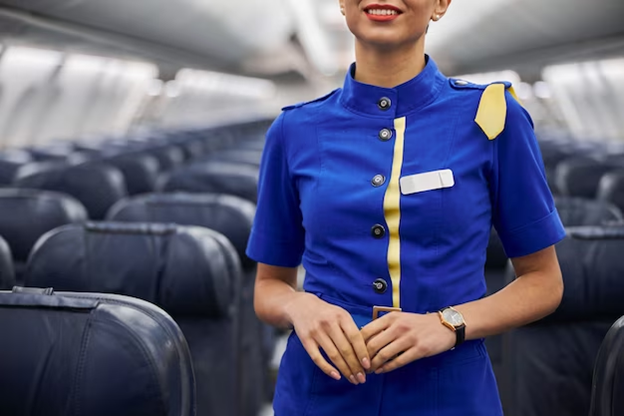Flight Attendant Program
At PHILLY-TECH, the flight attendants’ roles ensure that flight passengers receive services such as education about airplane safety instructions, food service, and other passenger related issues. Students will learn to provide customer service while creating a welcoming environment for passengers before, during each flight. The classroom and the simulator will provide students with experiencing flight attendants’ work inside of an airplane.
Our program is designed to provide the knowledge and skills required for individuals pursuing a career as a flight attendant. The course hours may vary depending on the FAA’s current regulations. Our program covers various aspects of flight attendant duties, including safety procedures, emergency response, customer service, and in-flight service.
Our students gain hands-on experience on an operational aircraft and receive practical training in safety procedures, customer service, and in-flight services. Upon successful completion of this program, students will be well-prepared to take the FAA certification exams for Flight Attendants.

Flight Attendant Program
AIRAVI 100: Introduction to the Aviation Industry (40 hours):
- Overview of the aviation industry
- Roles and responsibilities of flight attendants
- Historical perspective of flight attendants
AIRSAF 100: Safety and Emergency Procedures (80 hours):
- Emergency evacuation procedures
- Use of safety equipment (life vests, oxygen masks, etc.)
- Firefighting and smoke management
AIRFLY 100: In-Flight Services (60 hours):
- Customer service and passenger care
- Meal service and in-flight entertainment
- Handling special needs passengers
AIRFAA 100: Aviation Regulations and Documentation (80 hours):
- FAA regulations and international aviation rules
- Aircraft-specific documentation and procedures
- Passport and visa requirements
AIRMED 100: First Aid and Medical Emergencies (60 hours):
- Basic first aid and CPR training
- Handling common in-flight medical issues
- Communication with medical professionals on the ground
AIRCUL 100: Cultural Sensitivity and Conflict Resolution (40 hours):
- Cultural awareness and sensitivity training
- Conflict resolution and dealing with difficult passengers
AIREM 100: Emergency Drills (40 hours):
- Practical training on emergency evacuation procedures
- Firefighting drills and smoke-filled cabin simulations
AIRSEC 105: Security and Counterterrorism (40 hours):
- Aviation security measures
- Counterterrorism training and identifying threats
- Response to security incidents
AIRGEN 100: Aircraft Familiarization (60 hours):
- Different aircraft types and layouts
- Location of emergency equipment
- Safety checks and pre-flight inspections
AIROJT 100: On-the-Job Training (400 hours):
- Practical experience working on an operational aircraft
- Shadowing experienced flight attendants and assisting with duties
AIRPRE 100: Certification Preparation (40 hours):
- Review and preparation for the FAA certification exams for Flight Attendants.
Students have to contact the school administration if they want to take extra credits or transfer credits to pursue the Diploma Certificate or Associate of Applied Science (A.A.S.) Degree in their field of interest. Students will select required number courses in each of the areas listed to meet general education requirements graduation for the A.A.S. Some of these courses can be transferred directly from and to the university system and may be substituted for recommended courses on the outline. Students should speak with an advisor before doing so these selective courses are required for all students.
- Selected Communication Course (Choose two for Diploma or three for the Associate)
ENGL 100: Fundamentals of Speech
CPL 100: Career Planning
CPL 101: Communications and Career Strategies
ENGL 101: Composition
ENGL 102: composition
- Selected Mathematics Course (Choose two for Diploma or three for the Associate)
MATH 100:General Math
MATH 101:Intermediate Algebra
MATH 102:College Algebra
- Selected Social Science Course (Choose two for Diploma or four for the Associate)
ECON 105:Leadership
ECON 101:Principles of Microeconomics I
ECON 102:Principles of Macroeconomics II
SOC 101:Introduction to Sociology
PSYC 101: Introduction to Psychology
HIST 101: History
